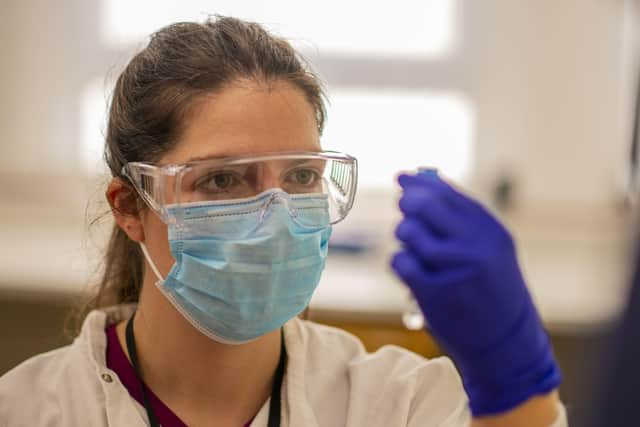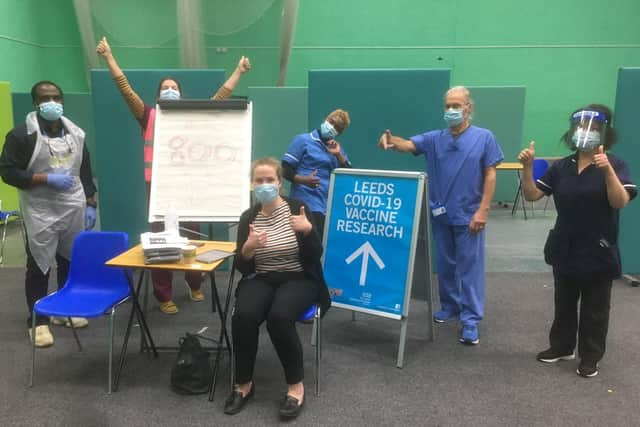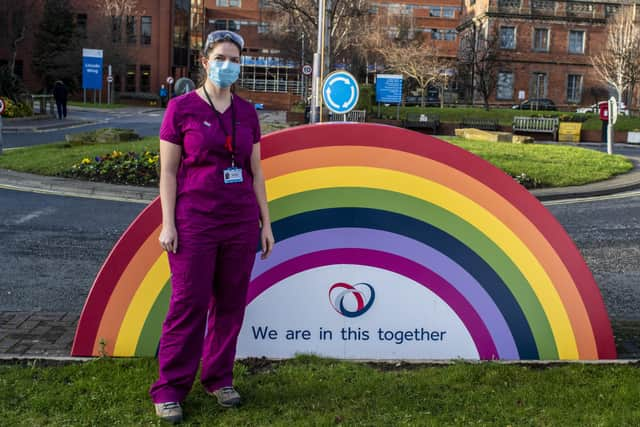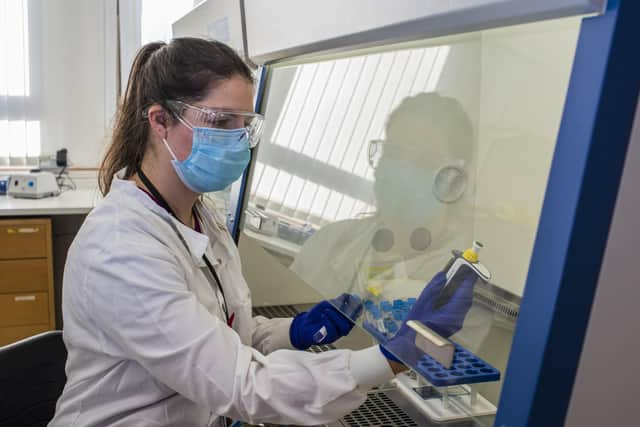‘The city should be immensely proud’ - How 806 people from Leeds helped prove the Novavax Covid vaccine works
The happy news that a new vaccine appears to be 89 per cent effective in preventing Covid-19 made headlines around the world and prompted the UK vaccines tsar Kate Bingham to end Dry January early to celebrate with a glass of wine - with hundreds of people from Leeds among those who deserved toasting for their key part in such a positive development.
Of the 15,000 people in the UK who took part in the clinical trial of the Novavax jab - which is on course to become the fourth Covid vaccine approved for use in the UK - the largest number of volunteers hailed from Leeds. A total of 806 people from the city participated in trials hosted at The Edge, the University of Leeds’ sports centre.
Advertisement
Hide AdAdvertisement
Hide AdDr Jennifer Murira, who played a central role in conducting the Leeds trials, says the initial trial results are “extremely positive news”.


“It looks like we now have another Covid-19 vaccine that is not only effective but also this is the first vaccine to show it remains effective against the new variant in the UK,” she says. “The people of Leeds should be immensely proud in contributing to this knowledge and we want to thank participants from Leeds that stepped up and put themselves forward. This will make a tangible difference to the whole of the UK and indeed the world in getting us out of this pandemic.”
The UK has secured access to 60 million doses of the new vaccine, which could be available in the second half of this year if it is approved by the medicines regulator.
The Novavax jab, which will be manufactured in Stockton-on-Tees after being developed by a US biotechnology company, appears to be effective against both the original strain of coronavirus and a mutant strain first identified in Kent. It has also shown around 60 per cent effectiveness against the South African strain of coronavirus, which has been worrying scientists due to concerns vaccines may not work against it.
Advertisement
Hide AdAdvertisement
Hide AdThe jab, which is given as two doses, has an advantage over those from Pfizer/BioNTech and Moderna in that it can be stored in a regular fridge rather than needing ultra-cold storage.


Dr Murira, who normally specialises in sexual health medicine but has become a Covid-19 research doctor since the start of the pandemic, says talks began last summer about the possibility of Leeds hosting a vaccine trial. The city was chosen in September and from October, trials began with hundreds of people from Leeds who had signed up to the NHS Vaccine Registry.
Dr Murira explains: “From October to December, we were based in the university sports hall. It was huge undertaking to get 800 people through as the first visit takes a good three hours.”
Half the volunteers received the vaccine with the others getting a placebo - with not even the doctors who were collating the results aware of which volunteer was getting which type of injection.
Advertisement
Hide AdAdvertisement
Hide AdMurira explains: “They were a group of nurses who were totally separate and behind a screen, they would press a button on the computer and they then knew whether to give that volunteer the placebo or the vaccine.”


The volunteers then downloaded an app to record how they were feeling and any potential Covid symptoms and then returned 21 days later for their second dose.
While the initial trial results are in, the role of the Leeds study volunteers is far from over. To assess the long-term protection offered by the vaccine, the volunteers are being asked to return for assessments 35 days after their first dose, then again at the six month and 12 month marks.
Dr Murira was at the very sharp of the Covid response during the initial lockdown, with her role being to tour Covid wards in hospital and see if patients wanted to volunteer for trial drug programmes that could potentially assist their recovery and help doctors learn what the most effective treatments for the virus were.
Advertisement
Hide AdAdvertisement
Hide AdShe says it had been moving to witness the unfolding vaccine trial, which around 200 hospital staff signed up to.


“It was emotional. I believe Leeds had the most sign-ups to the vaccine registry - Leeds should be incredibly proud of itself,” she says. “It is people who want to make a difference.
“There were a variety of reasons why people were taking part. You have got people who were extremely altruistic and said ‘We are going to do our bit’. Some other people saw it as an opportunity to hopefully get a vaccine.”
Dr Murira had been working on an HIV drugs trial when the pandemic hit and she took charge of running a Covid-19 research team. The team’s work was highly commended by the Leeds Teaching Hospitals NHS Trust for ensuring it “played a very prominent role in safely delivering nationally prioritised research studies at scale and pace”. St. James’s University Hospital in Leeds trialled treatments like antiviral drug remdesivir, which was shown to speed recovery times for patients with severe Covid.
Advertisement
Hide AdAdvertisement
Hide AdShe reflects: “Back in March we were going to patients with Covid, asking do you want to take part in these trials? It was a shock when it first happened. There were so many people to see and limited people I could go and see. You would go into a bay of six people all with severe Covid and I would start talking to one person and others would say, ‘Come and speak to me, I’m dying, I want this’. I tried to get to everyone who wanted to take part. That was difficult but it becomes your regular day-to-day work. It became really apparent I could not physically go and see everyone.”
But Dr Murira and the team quickly came up with an innovative solution. With other medical research studies on hold due to the pandemic, doctors and dentists involved in such work were recruited to help out with seeing patients in regards to the Covid drug trials.
“I actually managed to get 30 and we had five doctors and dentists a day, who were all from different specialisms, going out to see every patient and see if they wanted to get into a trial.”
Despite the professional challenges of the past year, Dr Murira says she considers herself fortunate.
Advertisement
Hide AdAdvertisement
Hide Ad“I’m in quite a privileged position. I get to go to work and see colleagues face-to-face. Not many get to do that nowadays and I feel a bit protected from the isolation and loneliness other people might be feeling. My work is interesting and it is something at the top of everyone’s agenda.
“It is amazing to think this is happening and we are getting results. To be part of that is extremely rewarding and satisfying.”
Among the Leeds volunteers for the Novavax trial was 49-year-old Ravindra Chaudhari. He told the Press Association last week that he felt from the start of the pandemic “it was pretty obvious that the only real way out was global vaccination”.
“We’ve got 100,000 people dead in this country, which to be honest is a disgrace – for a first-world nation like ours to have that death toll is a disgrace,” he said.
Advertisement
Hide AdAdvertisement
Hide Ad“We ask people like care home workers to work in care homes when there’s a virus circulating, we ask people to go into hospitals – NHS workers, ICU workers – in the same way we ask young people to go forward and fight and get shot in the army.
“At some point, people have to say ‘if we believe in this we have to do something’, and that’s where my mindset was – the only way out of this is vaccines.
“My view is the more vaccine candidates we have available the merrier. It means we can vaccinate more people faster and also it means you can now sort of stratify people – you want to give certain people one vaccine and certain people another based on clinical evidence.”
Dr Murira says she is grateful to all who participated in the vaccine trial.
Advertisement
Hide AdAdvertisement
Hide Ad“The people of Leeds have really stepped up. It was amazing. It is only by people volunteering that we are going to get answers.
“The UK is very forward leading on this and it is something to be proud of.”
How the vaccine works
The Novavax vaccine works like other vaccines by teaching the immune system to make antibodies to the coronavirus spike protein.
Researchers inserted a modified gene into a virus, called a baculovirus, and allowed it to infect insect cells. Spike proteins from these cells were then assembled into nanoparticles which, while they look like coronavirus, cannot replicate or cause Covid-19.
Advertisement
Hide AdAdvertisement
Hide AdThese nanoparticles are then injected into the body via the vaccine where the immune system mounts an antibody response. If the body encounters coronavirus in the future, the body is primed to fend it off.
The Leeds volunteers were recruited by Leeds Teaching Hospitals NHS Trust and other local healthcare organisations.
Support The Yorkshire Post and become a subscriber today. Your subscription will help us to continue to bring quality news to the people of Yorkshire. In return, you’ll see fewer ads on site, get free access to our app and receive exclusive members-only offers. Click here to subscribe.
Comment Guidelines
National World encourages reader discussion on our stories. User feedback, insights and back-and-forth exchanges add a rich layer of context to reporting. Please review our Community Guidelines before commenting.